2011年9月中级口译笔试真题完整版(含答案)
- 格式:docx
- 大小:213.55 KB
- 文档页数:24
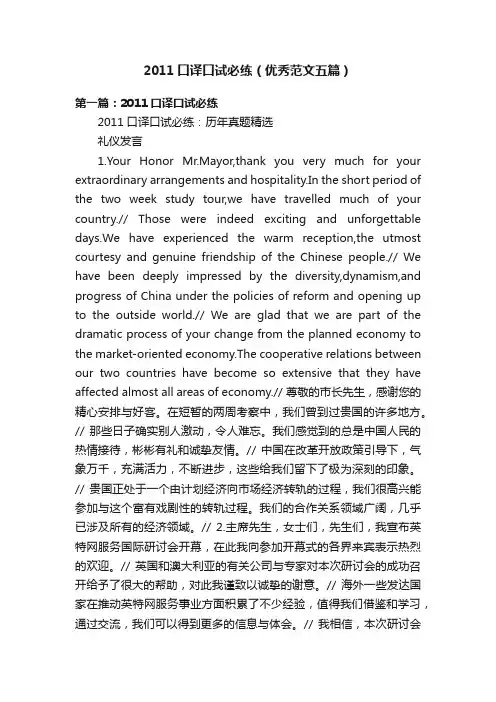
2011口译口试必练(优秀范文五篇)第一篇:2011口译口试必练2011口译口试必练:历年真题精选礼仪发言1.Your Honor Mr.Mayor,thank you very much for your extraordinary arrangements and hospitality.In the short period of the two week study tour,we have travelled much of your country.// Those were indeed exciting and unforgettable days.We have experienced the warm reception,the utmost courtesy and genuine friendship of the Chinese people.// We have been deeply impressed by the diversity,dynamism,and progress of China under the policies of reform and opening up to the outside world.// We are glad that we are part of the dramatic process of your change from the planned economy to the market-oriented economy.The cooperative relations between our two countries have become so extensive that they have affected almost all areas of economy.// 尊敬的市长先生,感谢您的精心安排与好客。
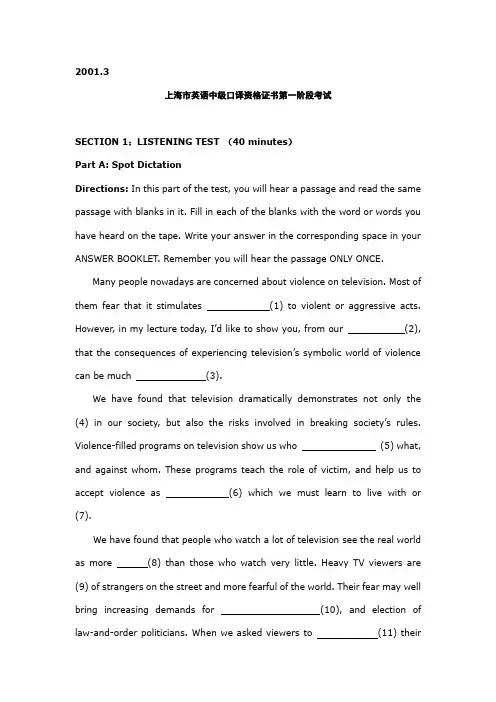
2001.3上海市英语中级口译资格证书第一阶段考试SECTION 1:LISTENING TEST (40 minutes)Part A: Spot DictationDirections: In this part of the test, you will hear a passage and read the same passage with blanks in it. Fill in each of the blanks with the word or words you have heard on the tape. Write your answer in the corresponding space in your ANSWER BOOKLET. Remember you will hear the passage ONLY ONCE.Many people nowadays are concerned about violence on television. Most of them fear that it stimulates (1) to violent or aggressive acts. However, in my lecture today, I’d like to show you, from our (2), that the consequences of experiencing television’s symbolic world of violence can be much (3).We have found that television dramatically demonstrates not only the (4) in our society, but also the risks involved in breaking society’s rules. Violence-filled programs on television show us who (5) what, and against whom. These programs teach the role of victim, and help us to accept violence as (6) which we must learn to live with or (7).We have found that people who watch a lot of television see the real world as more (8) than those who watch very little. Heavy TV viewers are (9) of strangers on the street and more fearful of the world. Their fear may well bring increasing demands for (10), and election of law-and-order politicians. When we asked viewers to (11) theirown chances of being involved in some type of violence during any given week, they provide (12) that television can induce fear and alertness: the heavy viewers were (13) percent more likely than the light viewers to pick such fearful estimates as 50-50 or one in 10, (14) a more plausible one in 100.We have found that violence on prime-time (15) cultivates exaggerated assumptions about the (16) in the real world. Fear is a universal emotion, and naturally, easy to (17). The exaggerated sense of risk and insecurity my lead to increasing demands for protection, and to (18) for the use of force by established authority. Therefore, instead of stimulating individual (19) and threatening the social order, television may have become our chief instrument of (20).Part B: Listening ComprehensionⅠ. StatementsDirections: In this part of the test, you will hear several short statements. These statements will be spoken ONLY ONCE, and you will not find them written on the paper; so you must listen carefully. When you hear s statement, read the answer choices and decide which one is closest in meaning to the statement you have heard. Then write the letter of the answer you have chosen in the corresponding space in your ANSWER BOOKLET.1.(A) I was the last to know about the MBA program.(B) I learned a great deal from the MBA program.(C) I misunderstood only the most difficult part of the program.(D) I dropped out of the program because it was difficult.2.(A) Our fall schedule will be discussed next Monday and Tuesday.(B) The Vice President has more meetings than her assistants do.(C) The Vice President and her assistants are not available on Monday andTuesday.(D) The Vice President and her assistants usually have full schedules twodays a week.3.(A) Few people did shopping at the supermarket because of the holidaybreak.(B) Most people did not like shopping during the holiday break.(C) The general manager was surprised that people paid little attention to hissupermarkets.(D) The general manager did not expect to see so many customers at hissupermarkets.4.(A) I don’t think he has the qualifications for such a post.(B) I am not sure if he has enough money to pay his college tuition.(C) He is not qualified to teach in the advanced Computing program.(D) He takes courses in Computing because he needs more qualifications.5.(A) Nothing can stop Jack from buying that projector.(B) The projector is so old that it becomes useless.(C) Repairing the projector is quite easy for Jack.(D) Jack has checked and found nothing in the projector.6.(A) Jenny and I do not get along because of our differences of opinion.(B) Jenny and I usually get up early most of the mornings.(C) Jenny and I can generally have a harmonious relationship.(D) Jenny and I do not get along because we make no effort to do so.7.(A) Typing the memorandum is sometimes unnecessary.(B) You will understand it if you read the memorandum a second time.(C) The first draft of the memorandum is not satisfactory.(D) The first draft of the memorandum is better than the second. one.8.(A) The study of inflation has interested both economists and governmentofficials.(B) The rate of inflation is higher than they expected.(C) Economists can not slow down the inflation rate.(D) Government officials and economists do not agree on the inflation rate.9.(A) Our company will arrange an exhibit for the Science and TechnologyWeek.(B) Our company has been upset by the city aut horities’ final decision.(C) We are displeased with the arrangement of the Science and TechnologyWeek.(D) We have dissuaded the city authorities from setting up the week’sdisplay.10.(A) Scientists have found a cure for the common cold in the past century.(B) Scientific discoveries were often misunderstood by the common people.(C) Scientists have yet to discover effective ways to conquer the cold virus.(D) Scientist have been unable to explain the cold climate in the pastcentury.Ⅱ. Talks and ConversationsDirections: In this part of the test, you will hear several short talks and conversations. After each of these, you will hear a few question. Listen carefully,because you will hear the talk or conversation and questions ONLY ONCE. When you hear a question, read the four answer choices and choose the best answer to that question. Then write the letter of the answer you have chosen in the corresponding space in your ANSWER BOOKLET.Questions 11~1411.(A) She received an emergency call the previous day.(B) She has never been to the city before.(C) She was invited to attend a wedding ceremony.(D) She’d like to spend the weekend there.12. (A) In a minute. (B) In less than half an hour.(C) At 111:13. (D) At noon.13. (A) Someone to talk with (B) Interesting books to read.(C) Something to eat and drink. (D) Puzzles and crossword games.14. (A) Thirteen pennies. (B) Fifty pennies.(C) A pound. (D) Half price.Question 15~1815. (A) Winter. (B) Spring.(C) Summer. (D) Fall.16. (A) 150 kilometres. (B) 240 kilometres.(C) 300 kilometres.. (D) 480 kilometres.17.(A) It is cold and dry,(B) It has a variety of climates.(C) It is largely predictable.(D) It snows in winter and rains in summer.18.(A) Because they have milder and warmer climates.(B) Because they have built more holiday inns and hotels.(C) Because they are located in the tropical region.(D) Because they are abundant in cheap flowers and vegetables.Questions 19~2219.(A) They don’t like food from other countries.(B) They don’t bother much about what they eat.(C) They fell that their food is better than any other in the world.(D) They really enjoy tinned and frozen foods.20. (A) Snack. (B) Breakfast.(C) Lunch. (D) Dinner.21. (A) Eat out in a foreign restaurant. (B) Prepare a big meal at home.(C) Tour around the world (D) Give a birthday party.22.(A) Because it is full of foreign tourists.(B) Because it has got a lot of foreign restaurants.(C) Because it is an ideal place for buying frozen foods.(D) Because it has attracted many college students.Questions 23~2623.(A) It is a free meal offered by TV producers.’(B) It is an evening meal to strengthen the family relationship.(C) It is a kind of snack food, especially for TV viewers.(D) It can be prepared by children, regardless of their age.24.(A) The preparation stage and the eating stage.(B) The preparation stage and the clean-up stage.(C) The eating stage and the clean-up stage.(D) The watch-TV stage and the talking stage.25.(A) They helped with setting the dinner table.(B) They washed and cut the vegetables and meats.(C) They watched TV programs in the sitting room.(D) They went out to buy TV dinners for the family.26. (A) Just a few minutes. (B) About 20 minutes.(C) Over 30 minutes. (D) As long as the commercial break lastsQuestions 27~3027. (A) A wine-bar attendant. (B) A musical artist.(C) A computer programmer. (D) An accountant.28. (A) Central London. (B) North London.(C) South-east London. (D) West London.29. (A) Playing the piano. (B) Teaching music.(C) Managing concerts. (D) Helping to run a charity.30.(A) Doing a home concert.(B) Finding a part-time job.(C) Giving piano recitals in the North.(D) Entering for a competition.Part C: Listening and TranslationⅠ. Sentence TranslationDirections: In this part of the test, you will hear 5 English sentences. You willhear the sentences ONLY ONCE. After you have heard each sentence, translate it into Chinese and write your version in the corresponding space in your ANSWER BOOKLET.(1)(2)(3)(4)(5)Ⅱ. Passage TranslationDirections: In this part of the test, you will hear 2 passages, you will hear the passages ONLY ONCE. After you have heard each passage, translate it into Chinese and write your version in the corresponding space in your ANSWER BOOKLET. You may take notes while you are listening.(1)(2)SECTION 2: STUDY SKLLS (50 minutes)Directions: In this section, you will read several passages. Each passage is followed by several questions based on its content. You are to choose ONE best answer, (A), (B), (C) or (D), to each question. Answer all the questions following each passage on the basis of what is stated or implied in that passage and write the letter of the answer your have chosen in the corresponding space in your ANSWER BOOKLET.Questions 1~5Some children do not like school. So what else is new? But in Japan that familiar aversion has reached alarming proportions. About 50,000 unhappy youngsters a year (out of a total school-age population of 20 million) suffer what Japanese behavioral experts call school phobia. School phobia is distinguished from other common childhood and adolescent psychological and emotional disorders by the patient’s reaction to, and fear of, the idea of going to school.Typically, it begins with fever, sweating, headaches, and diarrhoea; it often progresses to complete physical inertia, depression, and even autism.A doctor on a house call found a thirteen-year-old Tokyo boy who had not been to school in more than a year. He lives in a darkened room, receiving his food through a slot under the door and lashing out violently at his parents if they came too close. Once the boy was placed in a psychiatric ward treatment, he again became an open, seemingly healthy youngster. When he was sent home, however, his symptoms returned, and he was never able to go back to school.School phobia can be cured, usually with tranquilizers and psychotherapy. Rehabilitation takes about two years. Yet victims who are put in clinics or mental wards often prefer to stay there. Their day is filled with activities like knitting, painting, music, free time, and sports. Nurses try to create a familiar environment in which the children can feel that they are taking a certain amount of responsibility for their lives and can find some sense of self-worth.The causes of school phobia are not precisely known. In a few severe cases brain disorders have been diagnosed. A more common factor may be the overprotective Japanese mother who, some psychiatrists say, leaves her children ill-prepared to face the real world. Many researchers point to the unrelenting pressures for success faced by both children and adults in Japan, where stress-related disorders of all sorts are common. In addition, the Japanese educational system is one of the world’s most rigid, suppressing a child’s individual creative and analytical development. Says Dr. Hitoshi Ishikawa, head of the department of psychosomatic medicine at Tokyo University, “The problem won’t be cured until Japanese society as a whole is cured of its deep-rooted social ills.”1. The author chooses to write about school phobia because .(A)it is something new in Japan.(B)Most children have developed the disease(C)Its symptoms are not easily perceptible(D)A n alarming proportion of Japanese children suffer from it2. Which of the following is the purpose of the second paragraph?(A)To show that school phobia can be cured.(B)To suggest a way to deal with school phobia.(C)To describe the cause of school phobia.(D)T o present a typical case of school phobia.3. According to the passage, which of the following statements is true?(A)School phobia, which is widespread in many countries, is no cause foralarm.(B)The problem of school phobia in Japan can not be solved unless it getsrid of its social evils.(C)Despite school phobia the Japanese educational system remains on ofthe best in the world.(D)U nrelenting pressures in the Japanese society contribute greatly tosuccess.4. From the last paragraph, we know that the causes of school phobia .(A)can be easily determined(B)are complex and manifold(C)lie exclusively in the Japanese educational system(D)o riginate from the Japanese way of bringing up children5. Th e world “unrelenting” in the last paragraph is closest in meaning to .(A) unreasoning (B) continuous(C) limitless (D) unpleasantQuestions 6~10I left hospital in a taxi on the tenth day with Octavia in my arms and Lydia by my side. I was excited at the thought of getting home and having my baby to myself, but the cold of the outside air must have startled her, for she began to scream and screech violently in the taxi, and when we got home I did not quite know what to do. In hospital she had always been so quiet and sweet. I laid her down in her basket, but the mattress was a different shape from the hospital cot, and she looked strange and uncomfortable and screamed all the more fiercely. She looked odd, too, in her own Viyella nighties, after the regulation garments she had worn all her life until that afternoon. She went on and on crying, and I began to think that she would never adapt to real life. Lydia was getting almost as worried as I was, and after a while she said, as we both sate miserably and watched this small furious person, “Why don’t you feed her? That would shut her up, wouldn’t it?”I looked at my watch; it was half past four.“It’s not time to feed her yet,” I said. “In hospital, we had to feed them on the dot at five.”“Oh,” said Lydia, “half an hour one way or the other can’t make much difference.”“Don’t you think so?” I said. “But then she’ll wake half an hour early at thenext feed, and the next, and the next, and then what will I do?”“It wouldn’t matter, would it?”“I don’t know. I somehow feel thins would get all muddled and never get straight again. She was good and reasonable in hospital. And then she’ll get confused, and how will she ever know when it’s night time? How will she ever learn that it’s night?”“I should feed her,” said Lydia. “It looks to me as though she’s going to have a fit.”I didn’t think she would have a fit, but I couldn’t stand the sound of her crying, so I picked her out and fed her, and she became quiet at once, and fell asleep afterwards looking as though her mattress and nightdress were very comfortable after all. On the other hand, she did wake half an hour early at the next feed, and went on and on waking earlier, until we worked right back round the clock, for the truth was that she never went four hours but only three and a half. Looking back on it, it doesn’t seem to matter at all, but it seemed very important at the time. I remember. It took her ages, moreover, to learn about night and day, and in the end I concluded that they and been giving her secret bottles in the night at the hospital.However, on the whole, things worked out very well. I had a subsidized home help to begin with, and after a fortnight or so this woman whom Lydia had discovered, an amiable fat lady named Mrs Jennings, came in two days a week while dashed off to the library between feeds. Mrs Jennings adored babies, and I found that all her chat little darling tiny things, and where’s here little tootsie, fell quite naturally and indeed gratefully upon my ears.6. Octavia looked odd to her mother because .(A)the Viyella nighties were newly bought(B)her nightie was the wrong size(C)her clothes weren’t her usual ones(D)t he mattress was bigger than the one in the cot7. Why did Lydia suggest feeding the baby?(A)She found it was almost feeding time.(B)She obviously didn’t like the noise.(C)She could see Octavia was hungry.(D)S he believed it was better to feed her more.8. The mother didn’t want to feed the crying baby because the thought .(A)it was too early to feed her(B)the baby wanted to be fed at five(C)the baby couldn’t be hungry at the moment(D)i t would stop the baby sleeping at night9. The mother believed that in the hospital .(A)they had told her all the truth(B)they had confused the baby(C)the baby had been underfed at night(D)t here were things she hadn’t been told10. We learn from the passage that Mrs. Jennings .(A)first came in on a fortnight’s trial(B)helped the author with the baby(C)was found by Lydia in the library(D)w as not qualified for baby-sittingQuestions 11~15When the television is good, nothing—not the theatre, not the magazines, or newspapers—nothing is better. But when television is bad, nothing is worse. In invite you to sit down it front of your television set when your station goes on the air and stay there without a book, magazine, newspaper, or anything else to distract you and keep your eyes glued to that set until the station signs off. I can assure you that you will observe a vast wasteland. You will see a procession of game shows, violence, audience-participation shows, formula comedies about totally unbelievable families, blood and thunder, mayhem, more violence, sadism, murder, Western badmen, Western goodmen, private eyes, gangster, still more violence, and cartoons. And endlessly, commercials that scream and cajole and offend. And most of all, boredom. True, you will see a few things you will enjoy. But they will be very, very few. And if you think I exaggerate, try it.Is there no room on television to teach, to inform, to uplift, to stretch, to enlarge the capacities of our children? Is there no room for programs to deepen the children understatanding of children in other lands? Is there no room for a children’s news show explaining something about the world for them at their level of understanding?Is there no room of reading the great literature of the past, teaching them the great traditions of freedom?There are some fine children’s shows, but they are drowned out in the massive doses of cartoons, violence, and more violence. Must these be your trademarks? Search your conscience and see whether you cannot offer more to your young beneficiaries whose future you guard so many hours each and every day.There are many people in this great country, and you must serve all of us. You will get no argument from me if you say that, given a choice between a Western and a symphony, more people will watch the Western. I like Westerns and private eyes, too—but a steady diet for the whole country is obviously not in the public interest. We all know that people would more often prefer to be entertained than stimulated or informed. But your obligations are not satisfied if you look only to popularity as a test of what to broadcast. You are not only in show business; you are free to communicate ideas as well as to give relaxation. You must provide a wider range of choices, more diversity, more alternatives. It is not enough to cater to the nation’s whims—you must also serve the nation’s needs. The people own the air. They own it as much in prime evening time as they do at six o’clock in the morning. For every hour that the people give you—you owe them something. I intend to see that your debt is paid with service.11. The word “wasteland” (para.1) is used to describe .(A) western badlands (B) average television programs(C) TV film studios (D) theatrical plays12.C oncerning programs for children, it may be inferred that the authorbelieves that suchprograms should .(A) include no cartoons at all(B) include cultural and educational elements(C) be presented without commercial interruption(D) not deal with the Old West13. The statement “The people own the air.” (para. 4) implies .(A)Since they pay for watching television, they have a right to choose theirfavorite programs(B)They want to enjoy fresh air, because the air in the TV studio is polluted(C)They have the right to insist on worthwhile TV programs(D)They are obliged to air their views on public affairs14. Which of the following is NOT suggested in the passage(A)The needs of minorities must be met by television.(B)TV programs should be not only entertaining but also informative.(C)Violence is not a good ingredient for children’s television show.(D)C hildren’s television programs are uniformly terrible.15. The passage is most probably part of .(A) a scientific report (B) a newspaper editorial(C) a public speech (D) an academic paperQuestions 16~20With rapid growth identified as the most pressing of global population problems, the scene shifts immediately to villages in rural Kenya or urban slums in Karaas or bedrooms in Sedale where couples are making decisions about their reproductive behavior. Unlike other global issues which can be shaped directly by the actions of national and international power brokers, resolution of the problems posed by the magnitude and pace of contemporary population growth in the world ultimately depends upon the actions and behavior of a very large number of individual actors. Rapid population growth is the direct result of regular decistions made in private by literally many millions of persons throughout the world.Hence, we are all actors in the population drama. Each of us has the potential to aggravate the problem of rapid growth just as each of us can change the distribution of populations simply by moving. Population trends therefore represent nothing more than the combined decisions of many individuals, couples, and families. And, because these decisions are shaped and conditioned by commonly held values, goals, and aspirations, there are patterns to them and the actors appear to follow the broad outlines of a script.It is then evident that efforts to decrease the rate of population growth must eventually influence the decisions and behavior of many millions of couples if they are to be successful. Values and attitudes—the script that guides this behavior—must be a altered. To be even more specific, it means that couples, overwhelmingly poor and predominantly rural, in Africa, Asia, and Latin America where population growth is so high, must choose to limit the number of their children to fewer than three and must have the means to accomplish their goal. Similarly, couples in Europe, North America, and other low-fertility regions must continue to maintain their present patterns of having small families. Each couple must stick to its decision for some twenty to thirty years, or throughout their reproductive life span. In the economically less-developed world, this decision will be one that stands in stark contrast to those made by their parents and to the weight of cultural tradition.16. It can be concluded from the passage that .(A)large families may be considered as a heavy burden by the rural poor(B)the actions of national and international power brokers have animportant effect upon the decision made by the rural poor(C)the actions of those with the highest fertility, the rural poor, ultimatelydetermine the rate of population growth(D)h aving large families had more advantages than disadvantages in thosepoor areas17. The word “aggravate” (para 2) is closest in meaning to “”.(A) make clear (B) encounter(C) settle (D) make serious18. According to the author, the most effective way to decrease the rate ofpopulation growth is .(A)by making it a national policy that each couple must not give birth tomore than three children(B)by exerting more international pressure upon those high-fertility regions(C)by modifying the widely held values which guide the actions of manyindividuals and couples(D)b y providing the rural poor with means for limiting the family size19. It is obvious that the author of the passage .(A)shows indifference to the situation in the developed countries(B)is very concerned about global population problems(C)feels confident that the problem of population growth can be soonresolved(D)i s pessimistic about the future of those high-fertility20. The author has written the passage mainly for .(A) general readers (B) power brokers(C) economists (D) decision makersQuestions 21~25Sixty percent of all ethnic minorities in Britain live in London. Ethnic minorities only make up a small fraction of Britain’s population as a whole, but coming to London you could quite easily be mistaken for thinking there were many more. I have taken this for granted having grown up with this fantastic diversity of culture, background and influence. I have people all around me who talk with varying accents, speak different languages, share distinct foods and celebrate special festivals. However, London is far from being without its racial problems.The Campaign Against Racism and Fascism (CARF), a London based group, tells me that there is little doubt that, with the massive upsurge of xenophobia against asylum-seekers too, the fallout is affecting anyone perceived to be foreign or different. Recent attacks on black people have a ferocity that appalls police and community organizers a like. On March 4th this year, a 19-year-old Sudanese student, unconcernedly chatting to his white friend on a bus traveling through Wardsworth in south London, was suddenly stabbed in the stomach three times by a white youth brandishing a knife.Police investigations on this and other racist attacks have left many doubting the police’s supposed commitment to tackling r acial crime. Some say it has all been talk about target indicators with few results on the ground. But on March 24th this year, the Met. Police’s Racial and Violent Crimes T ask Force, drawing on the slow, painstaking intelligence on racial harassment gathered by their 32 Community Safety Units, carried out its first large-scale operation. In dawn raids on homes in all over London, one hundred people were arrested for offenses including racially aggravated criminal damage, grievous bodily harm,distributing racist literature and threats to kill. Over thirty people have been charged with racial offenses.Every year on our August public holiday, London, especially Notting Hill, comes alive for the Carnival. This celebration of variety, difference and the end of slavery—where I have seen people of all backgrounds, mixing, laughing and dancing together—is, I hope, the future of inter-racial relations in London. 20.The word “this” in “I have taken this for granted” (para. 1) refers to which ofthe following?(A) Sixty percent of all ethnic minorities in UK live in London.(B) Minorities only constitute a small part of UK’s population.(C) There are more minority people in Britain than it appears.(E)It is unwise for many more to come to London.21. The killing of the Sudanese student is to illustrate .(A)the brutality of attacks on black people(B)the fallout affecting anyone in poverty(C)the traffic problems in south London(D)t he unconcerned attitude of police23. The word “xenophobia” (para. 2) means “.”(A) partiality (B) arbitariness(C) discrimination (D) antipathy24. The word “intelligence” (para. 3) is closest in meaning to “.”(A) mentality (B) aptitude(C) information (D) interpretation25. What is the main topic of this passage?(A)The increasing rate of crime in London.。
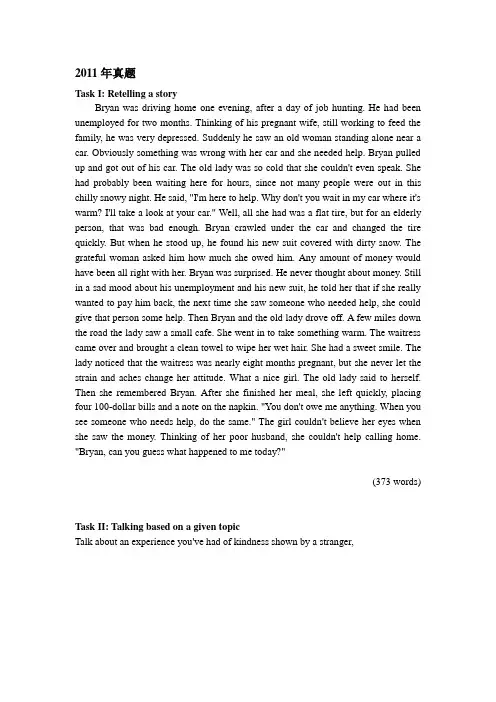
2011年真题Task I: Retelling a storyBryan was driving home one evening, after a day of job hunting. He had been unemployed for two months. Thinking of his pregnant wife, still working to feed the family, he was very depressed. Suddenly he saw an old woman standing alone near a car. Obviously something was wrong with her car and she needed help. Bryan pulled up and got out of his car. The old lady was so cold that she couldn't even speak. She had probably been waiting here for hours, since not many people were out in this chilly snowy night. He said, "I'm here to help. Why don't you wait in my car where it's warm? I'll take a look at your car." Well, all she had was a flat tire, but for an elderly person, that was bad enough. Bryan crawled under the car and changed the tire quickly. But when he stood up, he found his new suit covered with dirty snow. The grateful woman asked him how much she owed him. Any amount of money would have been all right with her. Bryan was surprised. He never thought about money. Still in a sad mood about his unemployment and his new suit, he told her that if she really wanted to pay him back, the next time she saw someone who needed help, she could give that person some help. Then Bryan and the old lady drove off. A few miles down the road the lady saw a small cafe. She went in to take something warm. The waitress came over and brought a clean towel to wipe her wet hair. She had a sweet smile. The lady noticed that the waitress was nearly eight months pregnant, but she never let the strain and aches change her attitude. What a nice girl. The old lady said to herself. Then she remembered Bryan. After she finished her meal, she left quickly, placing four 100-dollar bills and a note on the napkin. "You don't owe me anything. When you see someone who needs help, do the same." The girl couldn't believe her eyes when she saw the money. Thinking of her poor husband, she couldn't help calling home. "Bryan, can you guess what happened to me today?"(373 words)Task II: Talking based on a given topicTalk about an experience you've had of kindness shown by a stranger,Task III: Role-playingStudent A: Yale law professor Amy Chua's child-raising memoir Battle Hymn of the Tiger Mother has recently captured global attention. In the book, Chua stresses the merits of "Chinese parenting," which means high expectations, strict discipline (such as no TV or computer games), and punishment instead of encouragement. You think that such strict parenting is good for the growth of children, but your partner doesn't agree. Try to convince him/her. Remember you should start the conversation.Student B: Yale law professor Amy Chua's child-raising memoir Battle Hymn of the Tiger Mother has recently captured global attention. In the book, Chua stresses the merits of "Chinese parenting," which means high expectations, strict discipline (such as no TV or computer games), and punishment instead of encouragement. You think that such strict parenting is bad for the growth of children, but your partner doesn't agree. Try to convince him/her. Remember your partner will start the conversation.Task III: Role-playingStudent A: Yale law professor Amy Chua's child-raising memoir Battle Hymn of the Tiger Mother has recently captured global attention. In the book, Chua stresses the merits of "Chinese parenting," which means high expectations, strict discipline (such as no TV or computer games), and punishment instead of encouragement. You think that such strict parenting is good for the growth of children, but your partner doesn't agree. Try to convince him/her. Remember you should start the conversation.Student B: Yale law professor Amy Chua's child-raising memoir Battle Hymn of the Tiger Mother has recently captured global attention. In the book, Chua stresses the merits of "Chinese parenting," which means high expectations, strict discipline (such as no TV or computer games), and punishment instead of encouragement. You think that such strict parenting is bad for the growth of children, but your partner doesn't agree. Try to convince him/her. Remember your partner will start the conversation.。
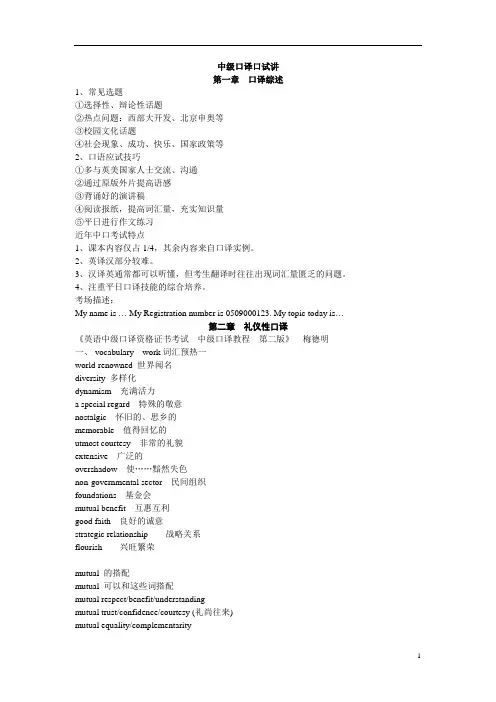
中级口译口试讲第一章口译综述1、常见选题①选择性、辩论性话题②热点问题:西部大开发、北京申奥等③校园文化话题④社会现象、成功、快乐、国家政策等2、口语应试技巧①多与英美国家人士交流、沟通②通过原版外片提高语感③背诵好的演讲稿④阅读报纸,提高词汇量,充实知识量⑤平日进行作文练习近年中口考试特点1、课本内容仅占1/4,其余内容来自口译实例。
2、英译汉部分较难。
3、汉译英通常都可以听懂,但考生翻译时往往出现词汇量匮乏的问题。
4、注重平日口译技能的综合培养。
考场描述:My name is … My Registration number is 0509000123. My topic today is…第二章礼仪性口译《英语中级口译资格证书考试中级口译教程第二版》梅德明一、vocabulary work词汇预热一world-renowned 世界闻名diversity 多样化dynamism充满活力a special regard特殊的敬意nostalgic怀旧的、思乡的memorable值得回忆的utmost courtesy非常的礼貌extensive广泛的overshadow使……黯然失色non-governmental sector民间组织foundations基金会mutual benefit互惠互利good faith良好的诚意strategic relationship战略关系flourish兴旺繁荣mutual 的搭配mutual 可以和这些词搭配mutual respect/benefit/understandingmutual trust/confidence/courtesy (礼尚往来)mutual equality/complementarityour mutual friend 我们共同的朋友mutual aid 互助mutual promise 相互的约定by mutual consent 双方同意mutual affection 相爱二、Expressing ThanksPermit me first to thank you, our Chinese hosts, for your extraordinary arrangements and hospitality. My wife and I, as well as our entire party, are deeply grateful.首先,请允许我感谢中国东道主的精心安排与好客,我夫人与我,以及代表团的全体人员,都深为感激。
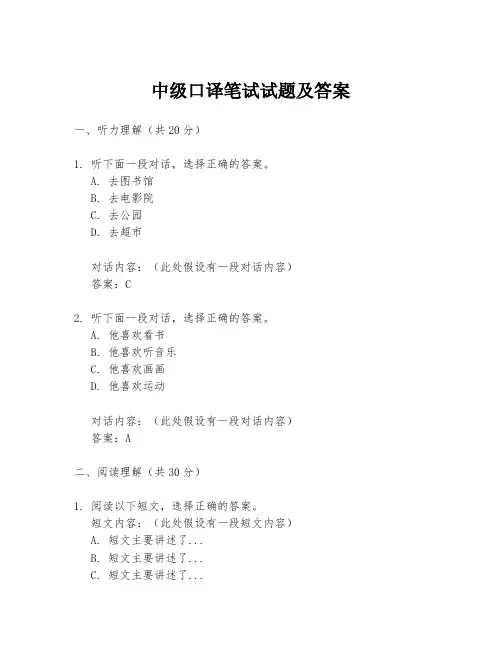
中级口译笔试试题及答案一、听力理解(共20分)1. 听下面一段对话,选择正确的答案。
A. 去图书馆B. 去电影院C. 去公园D. 去超市对话内容:(此处假设有一段对话内容)答案:C2. 听下面一段对话,选择正确的答案。
A. 他喜欢看书B. 他喜欢听音乐C. 他喜欢画画D. 他喜欢运动对话内容:(此处假设有一段对话内容)答案:A二、阅读理解(共30分)1. 阅读以下短文,选择正确的答案。
短文内容:(此处假设有一段短文内容)A. 短文主要讲述了...B. 短文主要讲述了...C. 短文主要讲述了...D. 短文主要讲述了...答案:B2. 阅读以下短文,选择正确的答案。
短文内容:(此处假设有一段短文内容)A. 短文主要讲述了...B. 短文主要讲述了...C. 短文主要讲述了...D. 短文主要讲述了...答案:D三、翻译(共30分)1. 将以下句子从英语翻译成中文。
英文:The weather is getting warmer, so I will take off my coat.中文:天气变暖了,所以我将脱掉我的外套。
答案:正确2. 将以下句子从中文翻译成英语。
中文:他每天早晨都会去公园跑步。
英文:He goes running in the park every morning.答案:正确四、写作(共20分)1. 根据以下提示写一篇短文。
提示:描述你最喜欢的季节,并解释为什么。
答案:(此处假设有一篇短文内容)评分标准:- 内容相关性:5分 - 语言准确性:5分 - 组织结构:5分 - 语法和拼写:5分总分:20分。
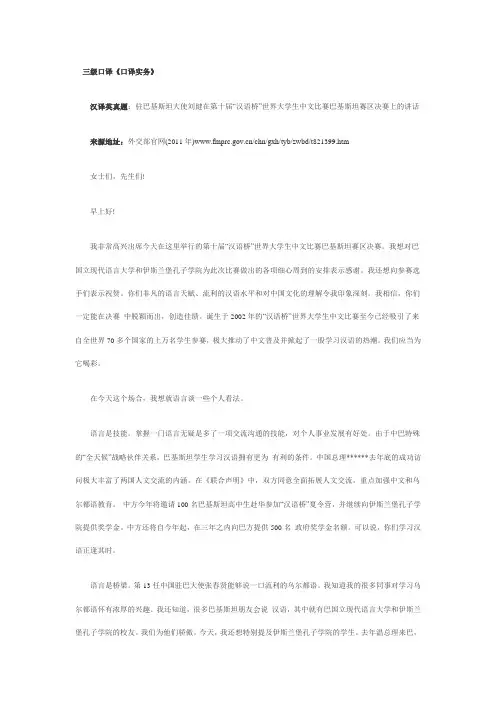
三级口译《口译实务》汉译英真题:驻巴基斯坦大使刘健在第十届“汉语桥”世界大学生中文比赛巴基斯坦赛区决赛上的讲话来源地址:外交部官网(2011年)/chn/gxh/tyb/zwbd/t821399.htm女士们,先生们!早上好!我非常高兴出席今天在这里举行的第十届“汉语桥”世界大学生中文比赛巴基斯坦赛区决赛。
我想对巴国立现代语言大学和伊斯兰堡孔子学院为此次比赛做出的各项细心周到的安排表示感谢。
我还想向参赛选手们表示祝贺。
你们非凡的语言天赋、流利的汉语水平和对中国文化的理解令我印象深刻。
我相信,你们一定能在决赛中脱颖而出,创造佳绩。
诞生于2002年的“汉语桥”世界大学生中文比赛至今已经吸引了来自全世界70多个国家的上万名学生参赛,极大推动了中文普及并掀起了一股学习汉语的热潮。
我们应当为它喝彩。
在今天这个场合,我想就语言谈一些个人看法。
语言是技能。
掌握一门语言无疑是多了一项交流沟通的技能,对个人事业发展有好处。
由于中巴特殊的“全天候”战略伙伴关系,巴基斯坦学生学习汉语拥有更为有利的条件。
中国总理******去年底的成功访问极大丰富了两国人文交流的内涵。
在《联合声明》中,双方同意全面拓展人文交流,重点加强中文和乌尔都语教育。
中方今年将邀请100名巴基斯坦高中生赴华参加“汉语桥”夏令营,并继续向伊斯兰堡孔子学院提供奖学金。
中方还将自今年起,在三年之内向巴方提供500名政府奖学金名额。
可以说,你们学习汉语正逢其时。
语言是桥梁。
第13任中国驻巴大使张春贤能够说一口流利的乌尔都语。
我知道我的很多同事对学习乌尔都语怀有浓厚的兴趣。
我还知道,很多巴基斯坦朋友会说汉语,其中就有巴国立现代语言大学和伊斯兰堡孔子学院的校友。
我们为他们骄傲。
今天,我还想特别提及伊斯兰堡孔子学院的学生。
去年温总理来巴,我们在巴中友谊中心举办了这样一场活动,就是两国总理与为中巴友谊做出突出贡献人士座谈。
座谈会临近结束的时候,伊斯兰堡孔子学院学员朱雷和14岁女孩拉比亚分别用中文和英文深情并茂地朗诵了一首题为“巴中友谊”的诗。
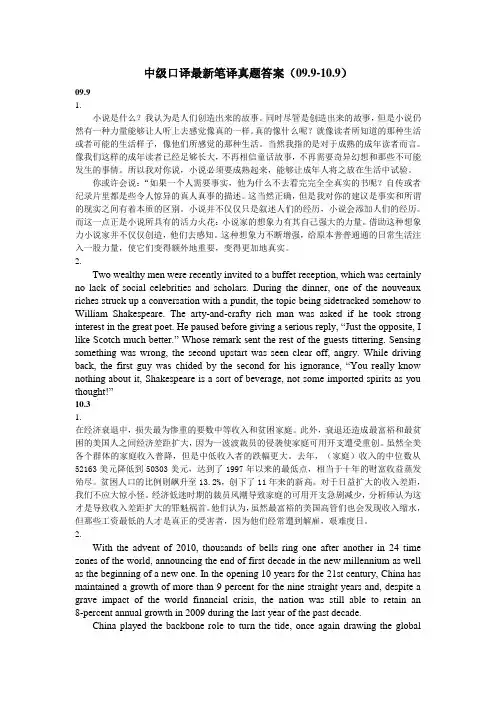
中级口译最新笔译真题答案(09.9-10.9)09.91.小说是什么?我认为是人们创造出来的故事。
同时尽管是创造出来的故事,但是小说仍然有一种力量能够让人听上去感觉像真的一样。
真的像什么呢?就像读者所知道的那种生活或者可能的生活样子,像他们所感觉的那种生活。
当然我指的是对于成熟的成年读者而言。
像我们这样的成年读者已经足够长大,不再相信童话故事,不再需要奇异幻想和那些不可能发生的事情。
所以我对你说,小说必须要成熟起来,能够让成年人将之放在生活中试验。
你或许会说:“如果一个人需要事实,他为什么不去看完完全全真实的书呢?自传或者纪录片里都是些令人惊异的真人真事的描述。
这当然正确,但是我对你的建议是事实和所谓的现实之间有着本质的区别。
小说并不仅仅只是叙述人们的经历,小说会添加人们的经历。
而这一点正是小说所具有的活力火花:小说家的想象力有其自己强大的力量。
借助这种想象力小说家并不仅仅创造,他们去感知。
这种想象力不断增强,给原本普普通通的日常生活注入一股力量,使它们变得额外地重要,变得更加地真实。
2.Two wealthy men were recently invited to a buffet reception, which was certainly no lack of social celebrities and scholars. During the dinner, one of the nouveaux riches struck up a conversation with a pundit, the topic being sidetracked somehow to William Shakespeare. The arty-and-crafty rich man was asked if he took strong interest in the great poet. He paused before giving a serious reply, “Just the opposite, I like Scotch much better.” Whose remark sent the rest of the guests tittering. Sensing something was wrong, the second upstart was seen clear off, angry. While driving back, the first guy was chided by the second for his ignorance, “You really know nothing about it, Shakespeare is a sort of beverage, not some imported spirits as you thought!”10.31.在经济衰退中,损失最为惨重的要数中等收入和贫困家庭。
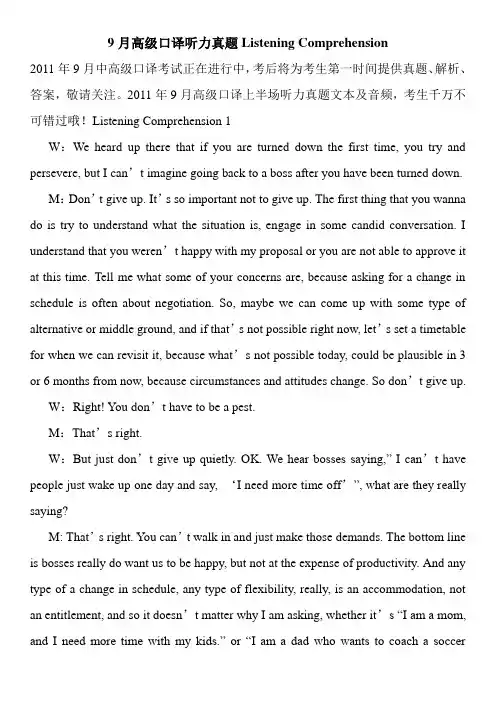
9月高级口译听力真题Listening Comprehension2011年9月中高级口译考试正在进行中,考后将为考生第一时间提供真题、解析、答案,敬请关注。
2011年9月高级口译上半场听力真题文本及音频,考生千万不可错过哦!Listening Comprehension 1W:We heard up there that if you are turned down the first time, you try and persevere, but I can’t imagine going back to a boss after you have been turned down.M:Don’t give up. It’s so important not to give up. The first thing that you wanna do is try to understand what the situation is, engage in some candid conversation. I understand that you weren’t happy with my proposal or you are not able to approve it at this time. Tell me what some of your concerns are, because asking for a change in schedule is often about negotiation. So, maybe we can come up with some type of alternative or middle ground, and if that’s not possible right now, let’s set a timetable for when we can revisit it, because what’s not possible today, could be plausible in 3 or 6 months from now, because circumstances and attitudes change. So don’t give up.W:Right! You don’t have to be a pest.M:That’s right.W:But just don’t give up quietly. OK. We hear bosses saying,” I can’t have people just wake up one day and say, ‘I need more time off’”, what are they really saying?M: That’s right. You can’t walk in and just make those demands. The bottom line is bosses really do want us to be happy, but not at the expense of productivity. And any type of a change in schedule, any type of flexibility, really, is an accommodation, not an entitlement, and so it doesn’t matter why I am asking, whether it’s “I am a mom, and I need more time with my kids.” or “I am a dad who wants to coach a soccerteam.” It doesn’t matter what my reasons are for asking. I have to be able to convince the boss that I’m gonna produce results.W: That’s one of these reasons you should say over and over again. Don’t go in with the pressing problem. Go in with the pressing solution.M: Solutions really are your way to victory, not always. But you are definitely not gonna succeed, if you go in with a laundry list of problems. If I come and I say: “I’m so sick of my commute. I really have to work from home one day a week.”W: But maybe the most skepticism raised by bosses is about the fact that you’re really gonna do as much or even more work. How do you convince your boss that you mean it that more work will be done. How do you convince and then show them.M: Offer benchmarks. It’s the best solution that you can provide. Because you are gonna say here is the proposal that I have. And here is how we’re gonna measure the results. Because I know results are important to you, and are important to me, too. So maybe we’re gonna have a conversation for 50 minutes every two weeks. So that we understand how the flow of communication is working. And if you are not happy, or I’m not happy, we have the ability to make changes along the way.W: Right.M: Flexibility is the key. In terms of getting these special accommodations, because I might say I want to work from home every Friday. But you know what? If there is a pressing business need, I will swap days. I will be here on that Friday,and so being flexible with this arrangement, with this propose change of schedule. Hopes you get control of your life, and keep the boss happy.Q1 What are the two people talking about?Q2 What is the bottom line for the bosses on the matter according to the man?Q3 What is the best solution to the issue being discussed in the conversation? Q4 Which of the following statements is true according to the conversation? Q5 What is the relationship between the two speakers most probably?。
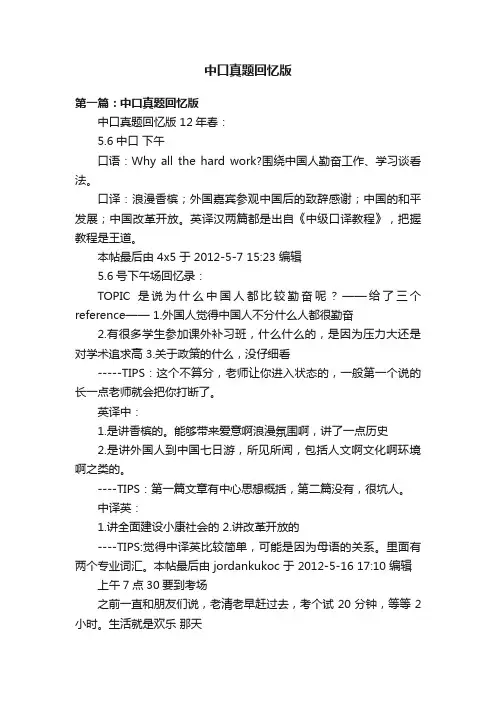
中口真题回忆版第一篇:中口真题回忆版中口真题回忆版 12年春:5.6中口下午口语:Why all the hard work?围绕中国人勤奋工作、学习谈看法。
口译:浪漫香槟;外国嘉宾参观中国后的致辞感谢;中国的和平发展;中国改革开放。
英译汉两篇都是出自《中级口译教程》,把握教程是王道。
本帖最后由 4x5 于 2012-5-7 15:23 编辑5.6号下午场回忆录:TOPIC是说为什么中国人都比较勤奋呢?——给了三个reference—— 1.外国人觉得中国人不分什么人都很勤奋2.有很多学生参加课外补习班,什么什么的,是因为压力大还是对学术追求高3.关于政策的什么,没仔细看-----TIPS:这个不算分,老师让你进入状态的,一般第一个说的长一点老师就会把你打断了。
英译中:1.是讲香槟的。
能够带来爱意啊浪漫氛围啊,讲了一点历史2.是讲外国人到中国七日游,所见所闻,包括人文啊文化啊环境啊之类的。
----TIPS:第一篇文章有中心思想概括,第二篇没有,很坑人。
中译英:1.讲全面建设小康社会的2.讲改革开放的----TIPS:觉得中译英比较简单,可能是因为母语的关系。
里面有两个专业词汇。
本帖最后由 jordankukoc 于 2012-5-16 17:10 编辑上午7点30要到考场之前一直和朋友们说,老清老早赶过去,考个试20分钟,等等2小时。
生活就是欢乐那天我赫然成为了第一批于是八点多就回家了第一批十几个人先去一个教室候考拿到一张纸,看了五分钟。
然后把纸收回去,我们又在那个教室做了10分钟再去各自的考场。
在一个正常教室的第一排考试。
我是背对黑板坐的。
进去先看到一位女老师。
我就说good morning, I am honored to be your today's first student.这个时候我发现她竟然比我紧张!难道我第一次考口试她第一次监考...然后进来一个年纪稍大的男老师。
我想当然得认为他不是主考结果他一进来很有气场得说Your name You XXXXX please然后我开始说topic他们开始登记我的信息考试内容:口试题:应不应该让市容环卫人员出国学习。
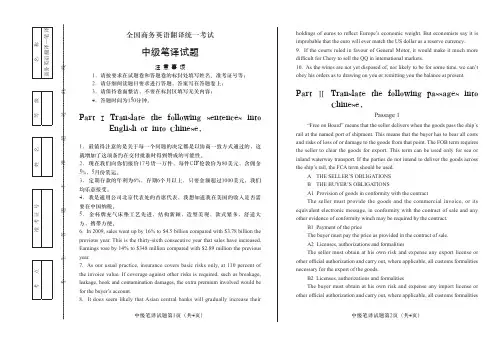
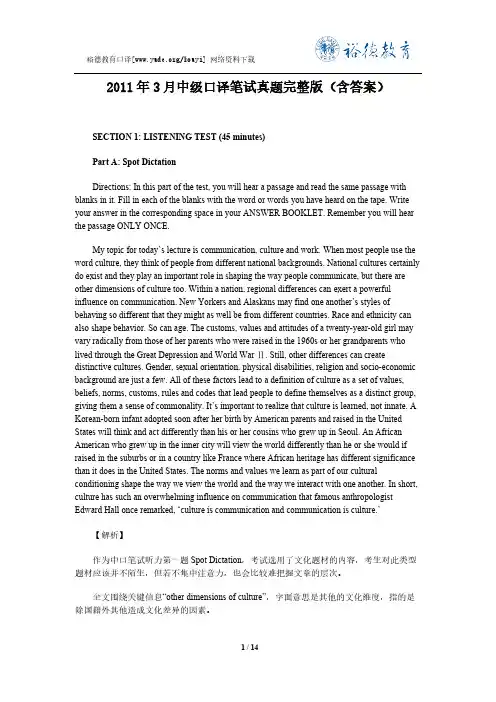
2011年3月中级口译笔试真题完整版(含答案) SECTION 1: LISTENING TEST (45 minutes) Part A: Spot Dictation Directions: In this part of the test, you will hear a passage and read the same passage with blanks in it. Fill in each of the blanks with the word or words you have heard on the tape. Write your answer in the corresponding space in your ANSWER BOOKLET. Remember you will hear the passage ONLY ONCE. My topic for today’s lecture is communication, culture and work. When most people use the word culture, they think of people from different national backgrounds. National cultures certainly do exist and they play an important role in shaping the way people communicate, but there are other dimensions of culture too. Within a nation, regional differences can exert a powerful influence on communication. New Yorkers and Alaskans may find one another’s styles of behaving so different that they might as well be from different countries. Race and ethnicity can also shape behavior. So can age. The customs, values and attitudes of a twenty-year-old girl may vary radically from those of her parents who were raised in the 1960s or her grandparents who lived through the Great Depression and World War Ⅱ. Still, other differences can create distinctive cultures. Gender, sexual orientation, physical disabilities, religion and socio-economic background are just a few. All of these factors lead to a definition of culture as a set of values, beliefs, norms, customs, rules and codes that lead people to define themselves as a distinct group, giving them a sense of commonality. It’s important to realize that culture is learned, not innate. A Korean-born infant adopted soon after her birth by American parents and raised in the United States will think and act differently than his or her cousins who grew up in Seoul. An African American who grew up in the inner city will view the world differently than he or she would if raised in the suburbs or in a country like France where African heritage has different significance than it does in the United States. The norms and values we learn as part of our cultural conditioning shape the way we view the world and the way we interact with one another. In short, culture has such an overwhelming influence on communication that famous anthropologist Edward Hall once remarked, ‘culture is communication and communication is culture.’ 【解析】 作为中口笔试听力第一题Spot Dictation,考试选用了文化题材的内容,考生对此类型题材应该并不陌生,但若不集中注意力,也会比较难把握文章的层次。
2011年3月中级口译笔试真题完整版(含答案SECTION 1: LISTENING TEST (45 minutesPart A: Spot DictationDirections: In this part of the test, you will hear a passage and read the same passage with blanks in it. Fill in each of the blanks with the word or words you have heard on the tape. Write your answer in the corresponding space in your ANSWER BOOKLET. Remember you will hear the passage ONLY ONCE.My topic for today‟s lecture is communication, culture and work. When most people use the word culture, they think of people from different national backgrounds. National cultures certainly do exist and they play an important role in shaping the way people communicate, but there are other dimensions of culture too. Within a nation, regional differences can exert a powerful influence on communication. New Yorkers and Alaskans may find one another‟s styles of behaving so different that they might as well be from different countries. Race and ethnicity can also shape behavior. So can age. The customs, values and attitudes of a twenty-year-old girl may vary radically from those of her parents who were raised in the 1960s or her grandparents who lived through the Great Depression and World War Ⅱ. Still, other differences can create distinctive cultures. Gender, sexual orientation, physical disabilities, religion and socio-economic background are just a few. All of these factors lead to a definition of culture as a set of values, beliefs, norms, customs, rules and codes that lead people to define themselves as a distinct group, giving them a sense of commonality. It‟s important to realize that culture is learned, not innate. A Korean-born infant adopted soon after her birth by American parents and raised in the United States will think and act differently than his or her cousins who grew up in Seoul. An African American who grew up in the inner city will view the world differently than he or she would if raised in the suburbs or in a country like France where African heritage has different significance than it does in the United States. The normsand values we learn as part of our cultural conditioning shape the way we view the world and the way we interact with one another. In short, culture has such an overwhelming influence on communication that famous anthropologist Edward Hall onceremark ed, …culture is communication and communication is culture.‟【解析】作为中口笔试听力第一题Spot Dictation,考试选用了文化题材的内容,考生对此类型题材应该并不陌生,但若不集中注意力,也会比较难把握文章的层次。
Spot Dictation In America there are no nobles or men of letters, and the common folk mistrust the wealthy; Consequently lawyers form the highest political class and the most cultivated circle of society. They have therefore nothing to gain by innovation, which adds a conservative interest to their natural taste for public order. If I were asked where I place the American aristocracy, I should reply without hesitation that it is not composed of the rich, who are united together by no common tie, but that it occupies the judicial bench and the bar. When I started researching this topic, I found an interesting website “Legal Reform Now”. As the name suggests, this website is devoted to legal reform and it is definitely concerned about the dominance of lawyers in American government. There I read an article by a political science professor from the university of Wisconsin. One observation the UW article confirms is that the legal profession is the dominant profession of the people re-elect to public office. For example, about half our representatives and two-thirds of our senators are lawyers. No other profession comes close to having the same the number of people in political office. Effectively, lawyers form our nation’s most powerful organized political constituency in America. Lawyers make our laws and lawyers interpret our laws. When judges are appointed, the American bar association is the only professional organization that is consulted to rate the fitness of potential judicial appointees. Our nation has been in existence for over 200 years and lawyers have been this nation’s aristocracy since its formation. Our system works, but do we really want to have a single profession in charge of our nation? Specifically, do we want to have the legal profession in charge? Next time you vote, that’s something to think about. 评析:这篇⽂章是关于律师在美国的地位。
(一)1 Covering an area of 175 acres , the Palace is enclosed by walls over 35 feet high. 2 The farm was ringing with the sound of the iron gong and they could see the laborers pouring out of their huts, pointing at the hills and shouting excitedly. 3 I walked the unemployment lines the other day to talk to this American,who was depressed, pained and bewildered. 4 Not knowing where the supermarket was, he couldn’t buy what he needs. 5 There are variety of means to accomplish students’ employability, including helping students to acquire well-developed communication skills, research capabilities, and analytical abilities. 1 该宫殿占地面积175英亩,四周为超过35英尺高的墙壁所围绕。
2农场里响起了铁锣声,而这时,他们可以看到劳工从棚屋中倾巢而出,指着小山并激动地呼喊着。
3前几天我走近失业人群并同这位美国人进行了交谈。
他看上去神情沮丧,疲劳不堪并且处于迷茫彷徨之中。
4 由于他不知道超市在哪里,他不能购买到所需要的东西。
5帮助学生获得受雇就业能力的方法有很多种,其中包括帮助他们获得良好的沟通技能、研究能力以及分析能力。
99年9月每年春季,数以万计的中外客商云集申城,参加一年一度的华东出口品交易会。
上海各类商品在这里与全国各地一比短长。
上海的优势在于科技实力,因此高技术产口的出口应成为上海外贸出口增长的“排头兵”。
著名物理学家杨振宁教授曾说:“高科技战场是中国超越发达国家的主战场,也是最后的战场。
”走发展高科技贸易之路,是历史的必然,也是末来的需要。
Every springhundredsof thousands of domesticand foreign businessmen swarminto Shanghai toattendthe annual East China Export CommodityTrade Fair.Here,all kinds of goods from Shanghai compete withthegoodsfrom other places in China. The advantage of Shanghai lies initsadvancedscientific and technologicalstrength, therefore theexport of high-tech products should take the lead in increasing Shanghai’s foreign trade and export.Professor YangZhenning, afamousphysicist,oncesaid, “The high-techbattlefield is themain and the last battlefield for Chinato overtake thedeveloped countries.” It is not only indispensable in history, butalso necessaryinthe future todevelop by way ofpromotinghigh-tech trade.98年3月这所大学的任务是培养德智体全面发展,能熟练运用外语从事外事和文化交流工作的合格人才。
裕德教育口译[www.yude.org/kouyi] 网络资料下载
1 / 24 2011年9月中级口译笔试真题完整版(含答案)
SECTION 1: LISTENING TEST (45 minutes) Part A: Spot Dictation Direction: In this part of the test, you will hear a passage and read the same passage with blanks in it. Fill in each of the blanks with the words you have heard on the tape. Write your answer in the corresponding space in your ANSWER BOOKLET. Remember you will hear the passage ONLY ONCE.
In America there are no nobles or men of letters, and the common folk mistrust the wealthy; Consequently lawyers form the highest political class and the most cultivated circle of society. They have therefore nothing to gain by innovation, which adds a conservative interest to their natural taste for public order. If I were asked where I place the American aristocracy, I should reply without hesitation that it is not composed of the rich, who are united together by no common tie, but that it occupies the judicial bench and the bar.
When I started researching this topic, I found an interesting website “Legal Reform Now”. As the name suggests, this website is devoted to legal reform and it is definitely concerned about the dominance of lawyers in American government. There I read an article by a political science professor from the university of Wisconsin. One observation the UW article confirms is that the legal profession is the dominant profession of the people re-elect to public office. For example, about half our representatives and two-thirds of our senators are lawyers. No other profession comes close to having the same the number of people in political office. Effectively, lawyers form our nation‟s most powerful organized political constituency in America. Lawyers make our laws and lawyers interpret our laws. When judges are appointed, the American bar association is the only professional organization that is consulted to rate the fitness of potential judicial appointees. Our nation has been in existence for over 200 years and lawyers have been this nation‟s aristocracy since its formation. Our system works, but do we really want to have a single profession in charge of our nation? Specifically, do we want to have the legal profession in charge? Next time you vote, that‟s something to think about.
评析:这篇文章是关于律师在美国的地位。律师组成了美国最高政治阶层,以及社会最具有教养的圈子。紧接着作者提到了律师在美国政府中占据统治地位,且自建国以来一直如此。因此律师就成了美国的“贵族”。最后作者提出问题“我们真的想让律师这个职业来管理我们的国家吗?”,呼吁选民在下次的选举投票中三思。
这篇听力材料政治色彩强,材料中的部分单词可能会给考生带来听辨和拼写的难度。难度较大。
cultivated adj 有教养的 innovation n.创新 裕德教育口译[www.yude.org/kouyi] 网络资料下载
2 / 24 conservative adj. 保守的
be composed of 由…组成 bench the bar 法官和律师 dominance n 统治地位 representatives n.众议员 senator n 参议员 aristocracy n 贵族
Part B: Listening Comprehension 1. Statements Directions: In this part of the test there will be some short talks and conversations. After each one, you will be asked some questions. The talks, conversations and questions will be spoken ONLY ONCE. Now listen carefully and choose the right answer to each question you have heard and write the letter of the answer you have chosen in the corresponding space in your ANSWER BOOKLET.
1. At the annual general meeting, the board chairman of the company outlined the development strategy for the next 5 years.
2. You needn‟t notify the maintenance office about the fixing of the faucet in the washroom. I can get Tom to take care of it. He is really handy.
3. Although the accountant promised to help by all he could, the auditor called into question the accuracy of the figures in the books.
4. We have carefully checked your qualifications and decided that we need someone with more office experience. We are sorry for the inconvenience.
5. The sales of Vitamin E, helped by the testimony of health food expert, and a number of leading medical authorities, have doubled in the past 5 years.
6. An average American male is expected to live 75.4 years, while the life expectancy of a female can be 80.4 years.
7. For many people in large cities, the reasons against owning a private car outweigh the reasons for owning one. Therefore, the answer is negative. 裕德教育口译[www.yude.org/kouyi] 网络资料下载
3 / 24 8. To believe that our company can be little affected or even immune to the current economic crisis is to ignore the most basic principles of trade and commerce.
9. At college, Betty receives a monthly allowance of $650 from home. She also earns $350 a month in her part-time job. And she spends about 80% of her income for daily expenses.